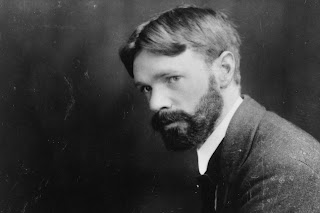Well, that was a slog. And let me be clear: I don't mean that as a compliment.
When it comes to Women in Love, I don't even know where to begin:
- It was either the case that sex wasn't much fun in 1920, or that D. H. Lawrence couldn't figure out how to write about it. Because I doubt the former is true, I've settled on the latter: for all of Lawrence's references to "loins" and "passion," I must admit, I missed the sex. I mean: I looked for it, and I thought it was coming a few times, but then when it did, it was so thoroughly obfuscated -- so vague and shadowy -- that it amounted to nothing at all.
- Women in Love is a novel of two couples: but the personalities of these individuals are so uncertain, and their motivation so unclear, that anything they have to say about love or sex is shrouded in a frustrated veil of philosophy. At least three of these characters have very little background, and the fourth, who is propped up with a generic story about early capitalism, doesn't fair much better: all of these characters approach sex as some moralistic thing warranting endless discussion. But as I say, I wondered by the end whether all this discussion was a sign of Lawrence's simple inability to capture the sex act itself.
- You could argue that, despite its title, this is a novel less about love and sexuality than it is about violence, gender relations, and humanity's relationship -- of all things -- with animals. And I suppose all of that would be true. But the fact is: there are other novels about these topics which are more successful, and which were written at about the same time as Women in Love.
- One area where I will concede that Lawrence has charted interesting ground is around love and its association with monogamy. Lawrence's characters -- especially the men -- wonder about this: whether marriage, for instance, precludes the ability to maintain loving, or "eternal," relationships with other men. Put differently, these men wonder whether they can have both: sexual intimacy with women and intellectual companionship with men. Lawrence seems to suggest that this dynamic -- this rivalry -- is a frustrated one, and the novel, which ends by engaging this topic, seems not to fully answer the question.
I don't mean to be negative, but Women in Love is not a novel to enjoy: it's a big hulking thing without a third dimension. There are ideas here, and there is a vague sense of time: but there's no character and there's no context. I can't imagine sex was as pained in 1920 as Lawrence presents it. Or put it this way -- I certainly hope it was not.


" I can't imagine sex was as pained in 1920 as Lawrence presents it." Demographics suggest that it was not. It has been a long time since I read the book, though.
ReplyDeleteII'm not sure that anyone really needs to "capture" the sexual act itself. I think that Fielding's line to the effect that "It would be tedious to give the particular conversation, which consisted of very common and ordinary occurrences," does just fine. I suppose that quite a few writers have damaged their work by acting on the belief that they had to capture it.
You do make an interesting point about Lawrence's notions of male friendship.
Thanks for your feedback, Anonymous. I appreciate your thoughts.
ReplyDelete